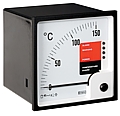KPM302x - TEMPERATURE GUARD - 2 x PT100 ELEMENT
- 3-channel Temperatur Guard for PT-100 element (RTD)
- 2, 3 or 4-wire PT 100 connection via external converter
- Triple relay for more flexibility
- A wide range of scaling available
- Very fast analogue output (<50mS), (F-version)
- "Highest up function"
Features
The KPM302x is a digitally controlled temperature guard/controller
for monitoring of temperature of machine bearings, windings etc.
The warning relay can be used to trip non-essential load or start a
cooling fan and the alarm relay may be used to trip the total load.
KPM303x can be scaled for a wide variation of ranges between -150 and up to 850 Degrees Celsius or to a Fahrenheit scale.
An AC or DC auxiliary voltage is required for the unit. A green LED
indicates POWER on. Start of monitoring function is delayed when power
is switched on (default 2 secs delay). In this way false tripping during
power up is avoided.
The precision DIN96 moving coil meter reads the monitored parameter, and has low-reflection glass to ease reading at a distance.
The triple-zone status LEDs at a glance gives the clear safety message:
KPM302C is the standard version with no analogue output. The
optional F-versions has an isolated analogue output signal proportional
to meter deflection.
The units three C/O relay outputs and trip levels and trip delays are user settable on unit rear to suit most applications.
Relay trip lamps (Red LED) flash instantly (approx. 1 flash per second)
when the trip level is passed, the relay trips after elapsed delay. The
lamp changes state and the trip relay operates after the pre-set delay.
If a trip condition ends during the delay interval, the timer will
automatically reset.
As standard the unit is supplied for automatic reset. Manual reset (latching relays) is optional (All G-versions).
The "highest up" function highlights the highest level of hazard in the
system, and only alerts the operator when conditions for an impending
danger are present.
The unit meets EN 61010-1 Cat. III, Pollution degree 2 and the relevant
environmental and EMC tests specified in EN 61326-2-4 to comply with the
requirements of the major Classification Societies.